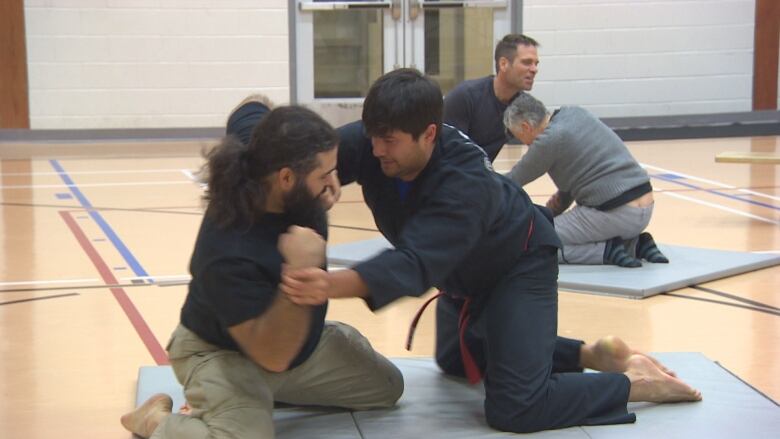Indigenous martial arts workshop comes to North End community centre
I didn't want to be fearful of [violence], says chief instructor George Lepine, I wanted to understand it

A man who learned Plains Cree combat techniques from his uncles as a young boy in Winnipeg's North End turned those teachings into a martial arts system and on Saturday, he brought it back home.
George Lepine said his 45 years of experience with other martial arts gave him the tools he needed to turn a series of fighting techniques into a system of its own: Okichitaw.
"Basically, the idea of the system is to identify your challenge and finish out as quickly as possible," said Lepine. "It's about dealing with multiple adversaries and multiple threats and being able to go through them as quickly as possible to achieve victory or self-preservation."
Lepine likened Okichitaw to a cross between wrestling and Krav Maga, a fighting system developed for the Israel Defense Forces.
But he said it's different from other martial arts because it's based on realistic scenarios instead of one-on-one combat.
"If you think of us historically, we didn't stand toe-to-toe and fight," he said. "We would actually rush into each other, either with a club or some type of [weapon], where we would commit ourselves to an attack."

On Saturday, Lepine brought Okichitaw to a workshop at Sergeant Tommy Prince Place, where he talked about the origins of the system and showed people how they can use the techniques.
"We really have to slow things down and walk people through it to the point where they can actually do it," he said. "Then we start picking up the speed and increasing the application, and then people can start understanding it."
He said the philosophy behind the practice is to hope for a worthy opponent, so you come away with something from every encounter.
"The idea the idea behind it is that you never want an easy fight," said Lepine. "My uncle used to say this: 'fight to the point where someone will write a song about you.'"
Growing up, Lepine said, he saw alcoholism and violence and it's part of what pushed him to explore martial arts.
"I knew that if I experienced violence, I'd want to be able to deal with it," he said. "I didn't want to be fearful of it. And I wanted to understand it."
Lepine said Okichitaw is more about growth and perseverance than violence.
"We say, 'Make my challenge difficult, restrictive and learning, so that when I overcome it, I will be a better person,'" he said.
"The idea is not so much having an enemy to be ruthless towards, but to understand that we're all going through challenges and Okichitaw is going to help you get through that."

With files from Nadia Kidwai












_(720p).jpg)


 OFFICIAL HD MUSIC VIDEO.jpg)
.jpg)



























































































